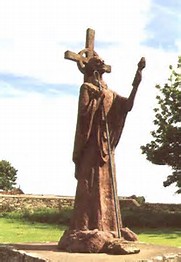St Aidan of Lindisfarne
The Apostle of Northumbria was born about 590 and at an early age became a monk at the Celtic Christian monastery on the Scottish island of Iona. England at this time was largely pagan, except in those remote western areas where the religion survived from Roman times or in those places that had been evangelized either by Irish monks or by those sent from Rome. The Anglo-Saxon invaders had set up a collection of small kingdoms and the exiled king of one, of them, Oswald of Northumbria, had taken refuge in Iona. When Oswald returned to the throne in 634, he brought Irish-style Christianity with him and Aidan was sent from Iona to lead the missionary effort. The king allowed Aidan to establish a monastery on the island of Lindisfarne, just off the east coast of England, which would become a great centre of learning and evangelization.
Of Aidan, Bede’s Ecclesiastical History of England, written in Lindisfarne in the 700s, said:
Aidan left the clergy a most salutary example of abstinence and continence; it was the highest commendation of his doctrine with all men, that he taught nothing that he did not practise in his life among his brethren; for he neither sought nor loved anything of this world, but delighted in distributing immediately among the poor whom he met whatsoever was given him by the kings or rich men of the world. He was wont to traverse both town and country on foot, never on horseback, unless compelled by some urgent necessity; to the end that, as he went, he might turn aside to any whomsoever he saw, whether rich or poor, and call upon them, if infidels, to receive the mystery of the faith, or, if they were believers, strengthen them in the faith, and stir them up by words and actions to giving of alms and the performance of good works.
Aidan died in 651 and his shrine became a site of miracles. Cuthbert, a shepherd, saw the soul of Aidan ascending to heaven accompanied by angels and vowed to become a monk; he did and became in turn the bishop of Lindisfarne and a saint in his own right.
